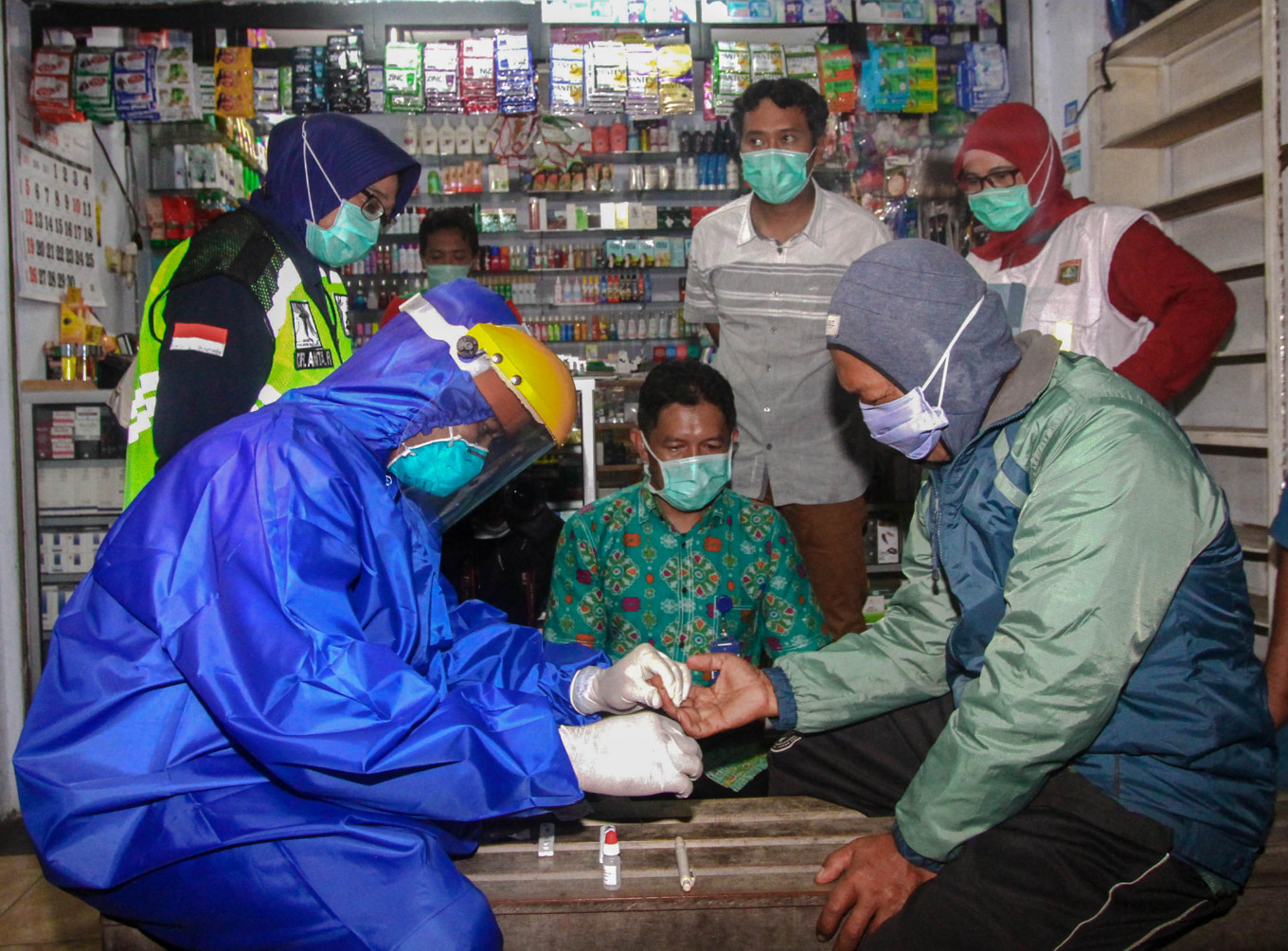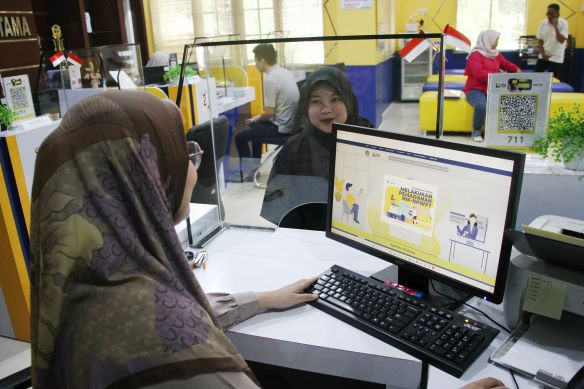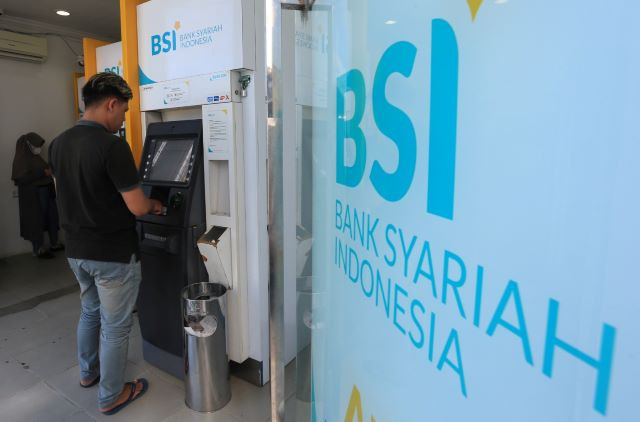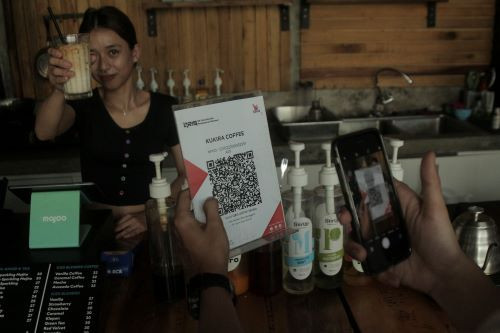With limited testing capability, Indonesia may battle COVID-19 blindfolded
With millions of people expected to leave Greater Jakarta to celebrate Idul Fitri in their hometowns across Java from April to May, it won’t be easy to track the spread of the disease on the island.
Change Size
 A health worker of the Malang Health Agency in East Java takes a blood sample of a local resident during COVID-19 rapid testing at Lawang Market in Malang, East Java, on Thursday. During the testing, health workers took the blood samples of traders, public transportation drivers and market visitors. (JP/Aman Rochman)
A health worker of the Malang Health Agency in East Java takes a blood sample of a local resident during COVID-19 rapid testing at Lawang Market in Malang, East Java, on Thursday. During the testing, health workers took the blood samples of traders, public transportation drivers and market visitors. (JP/Aman Rochman)
I
t’s been 47 days since the country officially admitted it was not immune to the coronavirus. Since the first patients were confirmed, things have only worsened, with scientists and economists pronouncing only doom and gloom about the days ahead.
The silver lining is that the government now takes the pandemic seriously. Partial lockdowns are in place in Greater Jakarta and other cities considered “red zones”, while the state budget has been revised to weather the COVID-19 storm.
Now it is no longer relevant to ask whether the government is being transparent about the outbreak. President Joko “Jokowi” Widodo has made it clear that everything should be made transparent and accessible for all to see. If anything, with the news about people dying of the coronavirus spreading fast via text-messaging applications and with many people already staying home to stay alive, there is no point for the President to withhold information to “prevent people from panicking”.
The question that we should be asking right now is not whether the government is willing to be fully transparent, but whether the country will ever know the true scale of the pandemic within its borders.
Alas, citizens aren’t the only one casting doubt on official figures. Officials, governors and even those leading the national COVID-19 task force have publicly acknowledged that the real number of cases out there could be higher than official tallies.
The real problem now is that we have legitimate concerns that Indonesia may not have the capacity to conduct enough testing to implement an effective “trace and isolate” strategy. Without mass testing, to quote World Health Organization director general Tedros Adhanom Ghebreyesus, virus-stricken nations are moving “blindfolded”.
Until only recently, Indonesia had relied on antibody test kits for mass testing. As the test kits are unreliable, the results are not included in the official count. Meanwhile, the government had been extremely selective in using the polymerase chain reaction (PCR) test to examine patients with COVID-19 symptoms. The PCR test results, which are more reliable, are included in the official coronavirus tally.
That is why Indonesia remains on the list of countries with woefully low testing rates, with only 136 tests per 1 million people, according to pandemic data released by Worldometer. For comparison, Malaysia and Singapore, two of our closest neighbors, have tested 2,988 people and 16,203 per 1 million people, respectively.
The government is aware of the problem and decided to conduct more PCR tests, with the President calling for 10,000 PCR tests per day, or around 300,000 per month.
Yet, we do not know if we have the ability to do that.
On April 15, Achmad Yurianto, the government’s spokesman for COVID-19 affairs, said the Health Ministry was scrambling to procure reagents – the substance used to conduct swab tests –from other countries as Indonesia’s stock of reagents would only last a week. The supply, he said, would only be enough for 35,000 tests.
The government estimates 1.2 million tests are needed by the end of May – a conservative figure. With effective policies to control people’s mobility, the coronavirus could infect some 500,000 people and kill almost 12,000, while the absence of such policies might lead to some 2.5 million positive cases by April, according to an estimate by University of Indonesia experts.
Indonesia had already tested 42,108 samples as of Friday. With the current supply only enough for 35,000 tests for the next few days, how could we fill the gap?
Due to a global shortage of reagents, the government is now asking countries with an oversupply of kits if they want to sell them. The Agency for the Assessment and Application of Technology (BPPT) is trying to produce reagents locally, but it is unlikely that it will make them on time.
While Indonesia still needs to train more people and acquire better lab equipment, no doubt the availability of reagents is the most crucial issue for Indonesia’s mass testing drive. Yurianto said the 34 local labs tasked with conducting the PCR tests used open-circuit machines that needed reagents for ribonucleic acid (RNA) extraction.
Indonesia is not alone. Hospital labs in the United States are also reportedly competing with other American labs to get reagents, according to The Oakland Press. The Nigerian Center for Disease Control has blamed the shortage of reagents for its low testing rate in the country, which only tests 35 per 1 million people.
It does not help that residents in Greater Jakarta are still ignoring physical distancing measures, while the central government and the local administrations appear to have little confidence in imposing a stricter lockdown for fear of social unrest. With millions of people expected to leave Greater Jakarta to celebrate Idul Fitri in their hometowns across Java from April to May, it won’t be easy to track the spread of the disease on the island.
Indeed, things would have been different if the government had acted faster. But, to be fair, no country, with very few exceptions, was ready for a pandemic of this scale. We just hope that the government is fully aware of its mistakes and can fully grasp the known unknowns to anticipate the worst possible scenarios.
It must use all resources available to procure the much-needed reagents to ramp up mass testing while also fine-tuning its lockdown policies to slow down the spread of the virus. But we the people should know that this is our war, not just the government’s. It takes the whole community, the whole nation, to band together to defeat this invisible enemy, especially when we may be marching into this battle blindfolded.









